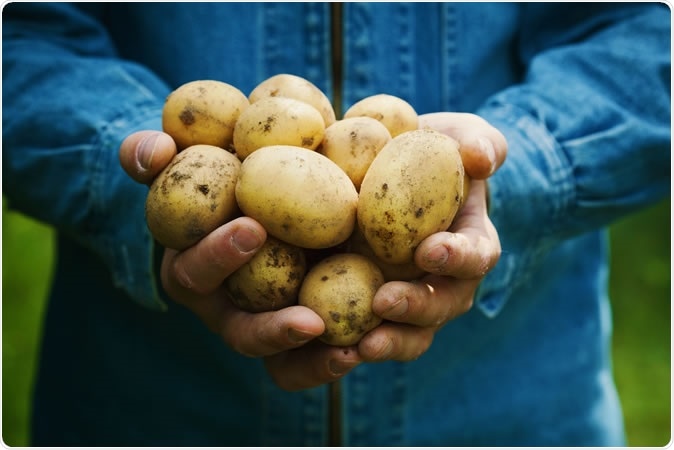Athletes who are training need to go through grueling endurance tests. One proven strategy to boost their performance during such tests is to eat carbohydrates as race fuels. Now, an interesting study published on October 20, 2019, in the Journal of Applied Physiology reports that athletes in training could get their energy just as well from a mound of pureed potato, rather than spending money on commercial carbohydrate pastes that don’t do the job any better. Potato keeps the blood sugar level high enough to allow prolonged strenuous exercise, and improves the performance during training. In this, it is identical to the effects produced by concentrated carbohydrate gels.

Image Credit: Julia Sudnitskaya / Shutterstock
Characteristics of a race fuel
A race fuel should provide plenty of carbohydrates, to allow the athlete to continue training without running out of energy. At the same time the carbohydrates should be in easily digestible and absorbable form.
The researchers wanted to find out if they could offer other “fueling options” for athletes, instead of forcing them to endure the same flavor of energy-boosting gel race after race. The best things about potatoes is their cost-effectiveness, the amount of nutrients they pack in a concentrated manner, and the way they offer plenty of carbohydrate, essential for proper training, in a whole-food format. The paper concludes, “Potatoes are a promising alternative for athletes… they [also] serve as a savory race fuel option when compared (with) the high sweetness of (carbohydrate) gels.”
The study
To examine the possible contribution of potatoes to race fueling alternatives for athletes in rigorous training, the researchers included 12 dedicated sportspeople who bicycled an average of 165 miles each week. All were veteran athletes with years of being in training. The average body weight was 71 kg, with an average age of 31 years. They had an average peak oxygen consumption of about 61 mL/ kg/minute. They had to first pass a qualification test, by achieving an aerobic fitness threshold and then cycling for 120 minutes, finally doing a time trial.
During the trials themselves, the scientists randomized the participants to one of three groups: those who got only water during the training period; those who got sweetened commercial carbohydrate gel; and those who got the same quantity of carbohydrates from potatoes. Before beginning the experiment proper, all participants were given a standardized meal plan for the preceding 24 hours. Then they were asked to cycle for 120 minutes and to complete a time trial. These were set up to closely resemble the demands put on them during actual races.
The exercisers were constantly monitored for blood glucose, core body temperature, the intensity of exercise, the rate of stomach emptying, and for any gut symptoms. In addition, blood lactate was also measured, since the body produces lactate as a metabolite from the oxidation of glucose under conditions of relative oxygen deprivation when the muscles are undergoing intense exercise.
The outcomes
Following all these evaluations, the results were analyzed in all the three groups. They showed that the increase in plasma glucose was quite similar in those who ate either potatoes or the carbohydrate gel. They achieved almost identical increases in their heart rate, and their final heart rate was higher than that measured in the water-only group. They also went up to higher speeds on their time trials, at 33 minutes each, compared to 40 minutes with only water. Blood lactate levels were higher in both fed groups compared to the water-only trialists.
The researchers highlight the fact that in all three groups, the occurrence of gut symptoms was relatively low, in contrast to earlier research. However, potato consumption wasn’t totally hassle-free – these participants had more abdominal pain, bloating and flatulence compared to either the carbohydrate-gel or the water-only groups. One reason suggested for this finding is the larger volume that must be ingested when potatoes are the source of carbohydrates to reach the same level of blood glucose. The researchers therefore say that “both (carbohydrate) conditions were well-tolerated by the majority of the study's cyclists.”
Implications
Researcher Nicholas Burd says, “We found no differences between the performance of cyclists who got their carbohydrates by ingesting potatoes or gels at recommended amounts of about 60 grams per hour during the experiments. Both groups saw a significant boost in performance that those consuming only water did not achieve.”
The final message is that this experiment provides “a proof of concept”, in the words of Burd, that athletes can actually rely on whole foods like potatoes, prepared in savory flavors, instead of only concentrated commercial sweetened carbohydrate packages, to have more options to keep up one’s flagging energy levels during a punishing race.
Journal reference:
Potato ingestion is as effective as carbohydrate gels to support prolonged cycling performance. Amadeo F. Salvador, Colleen F. McKenna, Rafael A. Alamilla, Ryan M. T. Cloud, Alexander R. Keeble, Adriana Miltko, Susannah E. Scaroni, Joseph W. Beals, Alexander V. Ulanov, Ryan N. Dilger, Laura L. Bauer, Elizabeth M. Broad, and Nicholas A. Burd. 17 Oct 2019. https://doi.org/10.1152/japplphysiol.00567.2019. https://www.physiology.org/doi/abs/10.1152/japplphysiol.00567.2019